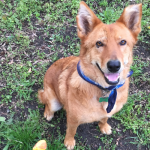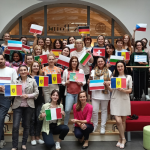Athletes at FSV UK
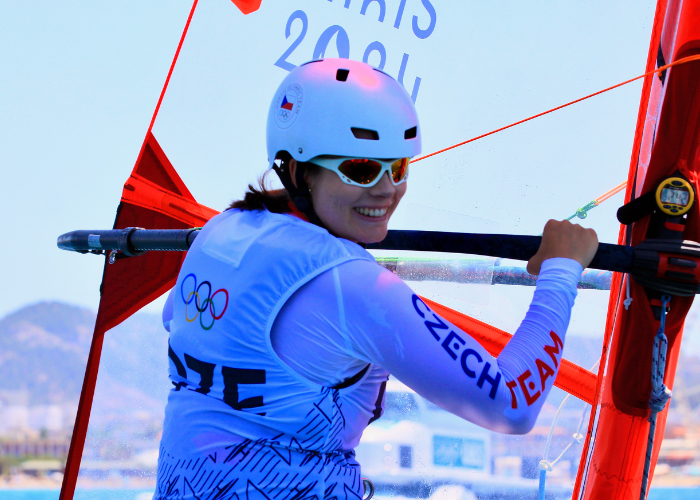
Among the students of the Faculty of Social Sciences, Charles University, we can find a number of passionate athletes who are achieving success on a domestic and international scale. They often have demanding training sessions almost every day of the week, which they try to combine as best as possible with their study obligations. Read our summer special about sports hopefuls at FSV UK.
Recently, two of our students have shone in the sports world, as they fought their way into the Czech national team at this year’s Olympic Games in Paris. Walker Eliška Martínková, who studies at the Institute of International Studies, placed 27th in her 20 kilometer walk.

Eliška Martínková (photo: Soňa Maléterová)
Kateřina Švíková, a windsurfer and student at the Institute of Economic Studies, also experienced her Olympic premiere. She was the only one from a sea-less country among the twenty windsurfers at the Olympics. She advanced to the quarterfinals and finished 9th overall. You can look forward to an interview with both of them in the next episode of our De Facto podcast, which will be released at the beginning of September.
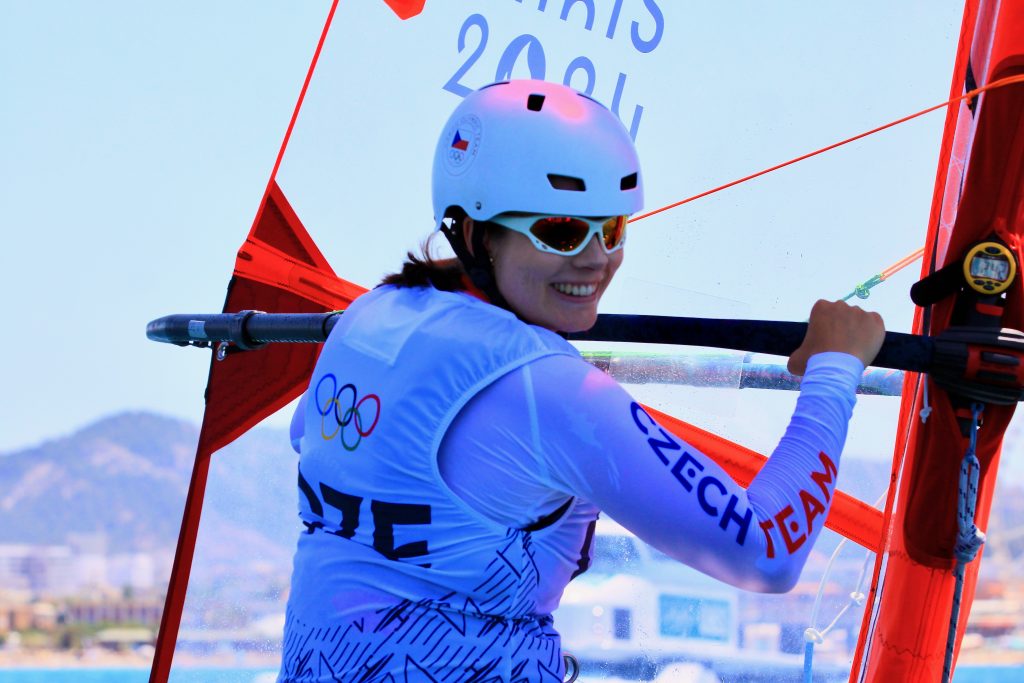
Photo: archive of Kateřina Švíková
More of our students are interested in water sports. For example, Emma Junasová from the Institute of Political Studies has been playing water polo since she was eight years old. In the past season, she was a guest in the Slávia UK Bratislava team, which dominated most competitions in Slovakia – together with her teammates, she won the title of Slovak champion and the first place in the Slovak Cup. “Both school and sport in themselves require a lot of time, effort, discipline and self-denial. Of course, their combination is more demanding. You spend your working weeks studying and training, your weekends traveling and competing. Time for yourself is precious,” describes the student of the Master’s program in International Relations.
Thanks to sports, she had the opportunity to visit different corners of the world in recent years, which greatly inspired her to study international relations. “I’ve experienced Australia’s excellent infrastructure, enjoyed the technological sophistication and chewing gum free trails of Singapore, been blinded by Moscow’s snow, lived in the Azerbaijan Olympic Village with other athletes from all over Europe and collected their badges,” says Emma. “My love for language and words, for geography and the history of humankind predestined me to study the humanities. My travel and curiosity helped me in choosing my studies. The international relations that I have chosen are so dynamic that if I devote myself to them, I know that I will not suffer from boredom,” she adds.
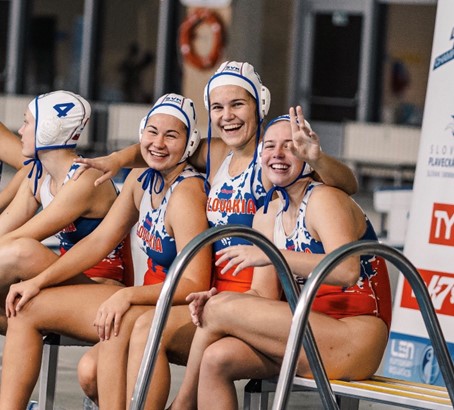
Photo: archive of Emma Junasová (second right)
Matyáš Kubíček from the Institute of Economic Studies fell under the spell of fin swimming at the age of eight. This discipline is divided into several categories and Matyáš focuses mainly on swimming with a so-called monofin. “I like the very feeling of the water and above all the speed that we can develop thanks to the fins. In addition, thanks to the long routes in which I specialize, I usually have enough time when I am immersed in the water and simply cannot perceive anything or anyone around me,” explains the student of the Bachelor’s program in Economics and Finance. In April, he achieved significant success at the World University Championships Finswimming held in the Colombian city of Pereira at an altitude of about 1,400 meters above sea level. He placed 2nd on the 400-meter track and won the 800-meter event. He then placed 6th with his colleagues in the relay (4 x 50 meters).
But with the transition to university, he had to fundamentally change the way he trained. “Not only because of the schedule, but also because of the change of city and the club where I train, I didn’t have time to devote myself to the pool as much as I was used to. It took some time, but I’ve already found a new system, so I’m catching up with school and swimming,” he says. In the future, however, he expects that he will inevitably have to reduce the volume of training and will have to prioritize studies or employment. Even before that, however, he would like to reach the highest goal in his discipline, which is the World Games. “Any success at this competition would of course be great, but before ending my career I would like to at least make it to the World Games,” he adds.
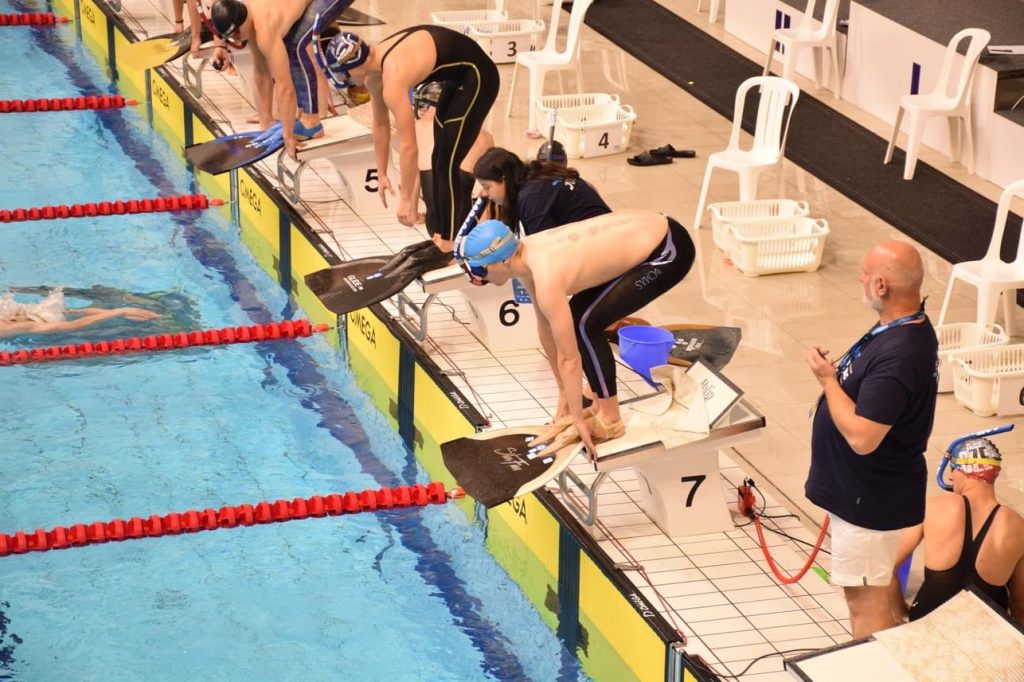
Photo: archive of Matyáš Kubíček
It’s all about teamwork
Doctoral student Diana Kmeťková from the Institute of Economic Studies, who has been figure skating since the age of six, is in contact with water in a slightly different sense (and state). She first started with solo figure skating in Slovakia, but after moving to Prague she switched to synchronized figure skating in the Olympia team. Here, she tried to combine intensive training with her studies at FSV UK and the Faculty of Mathematics and Physics.
“The beginnings were definitely difficult. During my Bachelor’s studies, I often had classes all day, then in the evening I ran to training sessions. The transition from solo figure skating to a team sport was also something I had to get used to. Studies have always been a priority for me, but being part of a team brought a dose of responsibility that I didn’t have to deal with to such an extent before. Missing training sessions because I had a difficult test in mathematical analysis or a demanding exam coming was not acceptable, so I had to learn to plan well and manage my time,” says the PhD student in the Economics and Finance program. She personally considers the 9th place at the 2022 World Championships in Hamilton, Canada, to be her greatest success. She would like to repeat her position in the top 10 teams among the world’s best in the following season.
Although she still competes in synchronized figure skating and the sport is a significant part of her life, she now invests more of her time in work and studies. “I would like to continue figure skating. For example, as a trainer, which I already do on occasion. However, I am not currently considering full-time training. As a professional, I would like to devote myself to research, but I am also open to a transition to the private sector,” she adds.
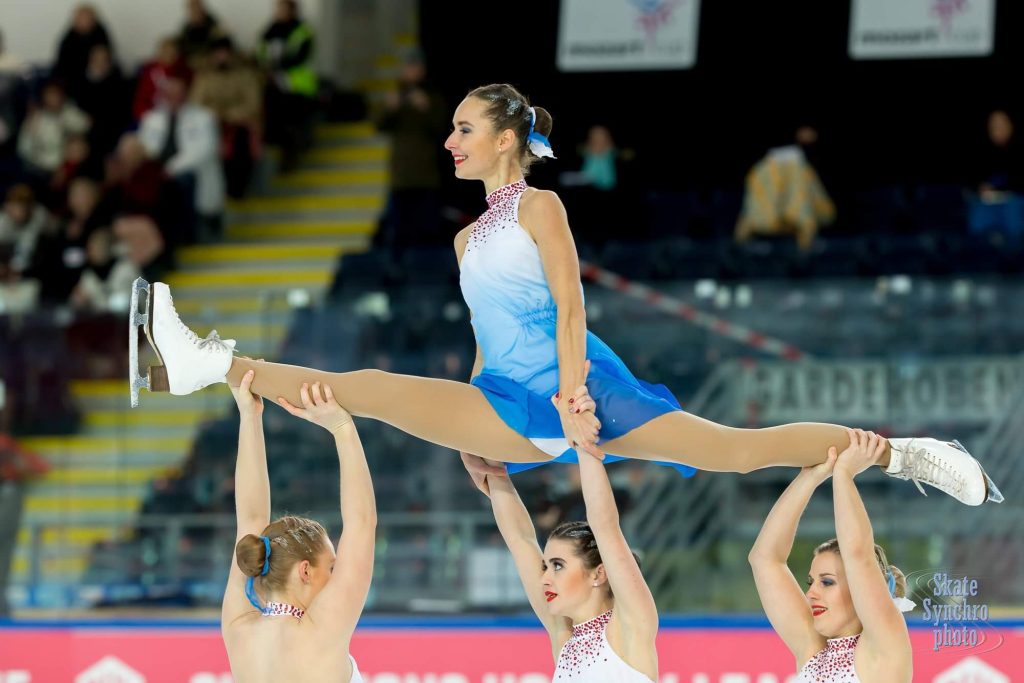
Photo: archive of Diana Kmeťková
Tomáš Hanák from the Institute of International Studies, who has focused intensively on floorball in his sports career, is also familiar with close teamwork. Together with his teammates, they became junior world champions and became the first Czech team in history to win the Champions Cup last year. He now belongs to the shortlist of the men’s national team, with which he won a series of floorball tournaments, the Euro Floorball Tour (EFT). “I would definitely like to win gold at the upcoming senior world championships. I would say that is now the main goal in my career,” says the student of the Territorial Studies Bachelor’s program.
According to him, university studies can still be combined with intensive training. “Floorball is a sport that combines beautifully with school. Basically, it is adapted for this. I am free during the day and spend my evenings on training. Excuses from lectures only come when there is a national team training session or another national team event,” he explains. In the future, however, his studies will take priority in his life. “Especially with regard to some kind of career growth, because it is not possible to make a living from floorball yet. Having a job with floorball is necessary,” he adds.
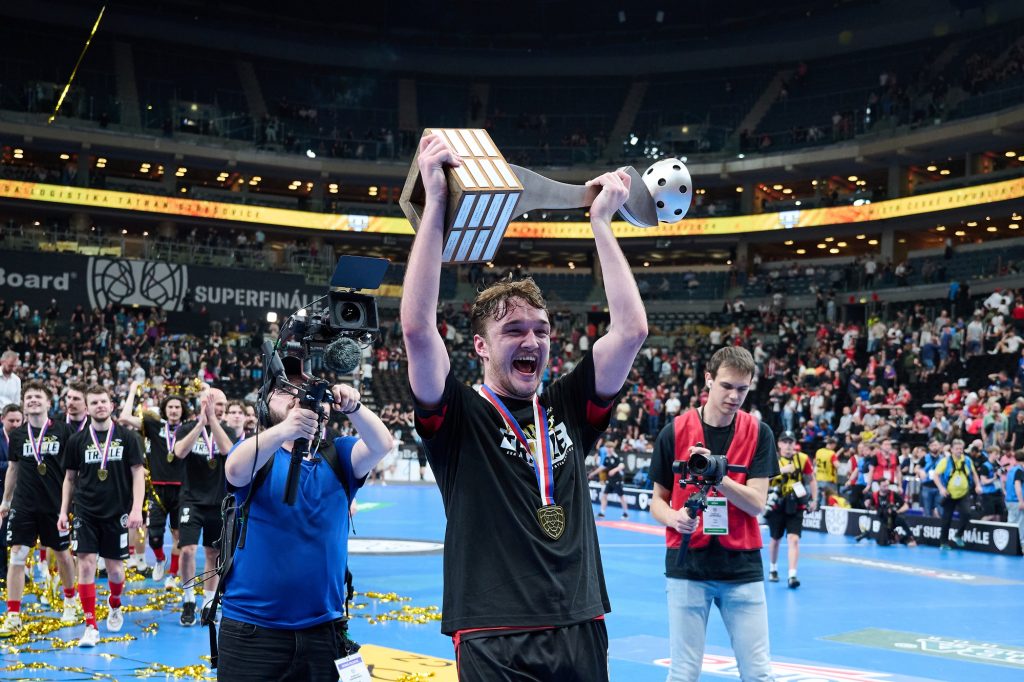
Tomáš Hanák (photo: Barbora Reichová)
Daniel Pařízek from the Institute of Communication Studies and Journalism, who has been practicing judo since the age of four, looks at his academic and sports career in a similar way. In 2019, he won 5th place at the Czech Republic Championship, and a year later he won 3rd place again at the Czech Cup in Brno. In the last academic year, he used to have three training sessions a week, plus up to four individual training sessions in the gym. Even so, he managed to put together a busy schedule well. “I’m not an elite athlete who has two-phase training every day. And if I can’t manage once in a while, I won’t come to training and the world won’t collapse,” says the student of the Bachelor’s program in Communication Studies with a specialization in Journalism.
He considers judo primarily his hobby and does not plan to practice it professionally in the future. “Now I’m going to Turkey for Erasmus for half a year, where they have an excellent judo background, so I hope to train a little there. When I come back, I would like to take the black belt exams,” he states. “But as I say, I mainly have judo as my hobby. You can’t make a living from training unless you’re Klammert or Krpálek,” he adds.
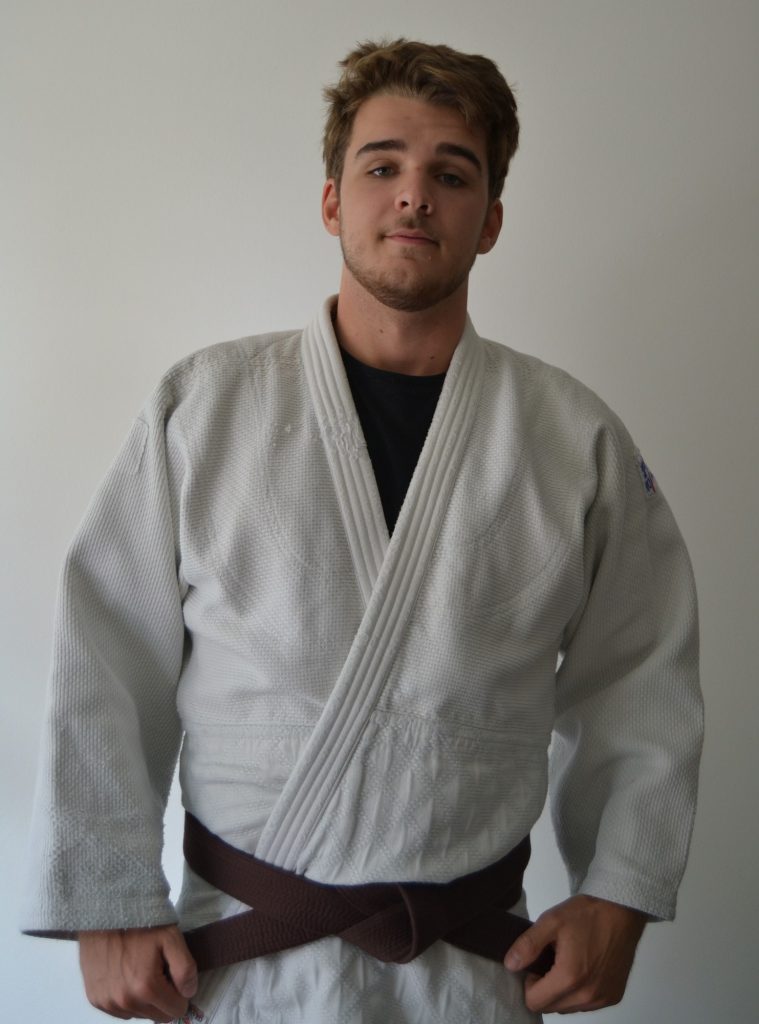
Photo: archive of Daniel Pařízek
Centimetres and seconds matter
Aneta Kohlmannová from the Institute of International Studies, has been playing table tennis since she was nine. He now plays at AC Sparta Praha and has been ranked among the top 100 players in the Czech Republic for several seasons in a row. Among her greatest achievements are participation in the quarter-finals of the Czech Women’s Team Cup 2023/2024, a bronze position in the 1st Women’s League and several bronze medals from the Czech Academic Games. “Within seconds you have to know what and where the opponent played, with what spin and swing, where and how far they stand, how much spin from the ball is coming back to you from them and where you want to play it yourself. The psychological, technical and tactical side is something that many people don’t see on the screens,” explains the student of the Territorial Studies Bachelor’s program.
During the season, he has up to four training sessions and two matches per week. In the first year of her Bachelor’s studies, she therefore had to create a system in order to keep up with everything. “Later on, I sometimes had to choose optional or compulsory elective courses according to whether I could make it to the training sessions I have in the afternoon,” she says. She wants to devote herself intensively to sports in the future. She has been training children for six years, and this year she successfully completed a two-year course for a B coaching license. “Since I was a child, sport has been on a higher position than studies for me but I don’t omit either. Studies are of course important, but I have been drawn to sports since childhood,” she adds.
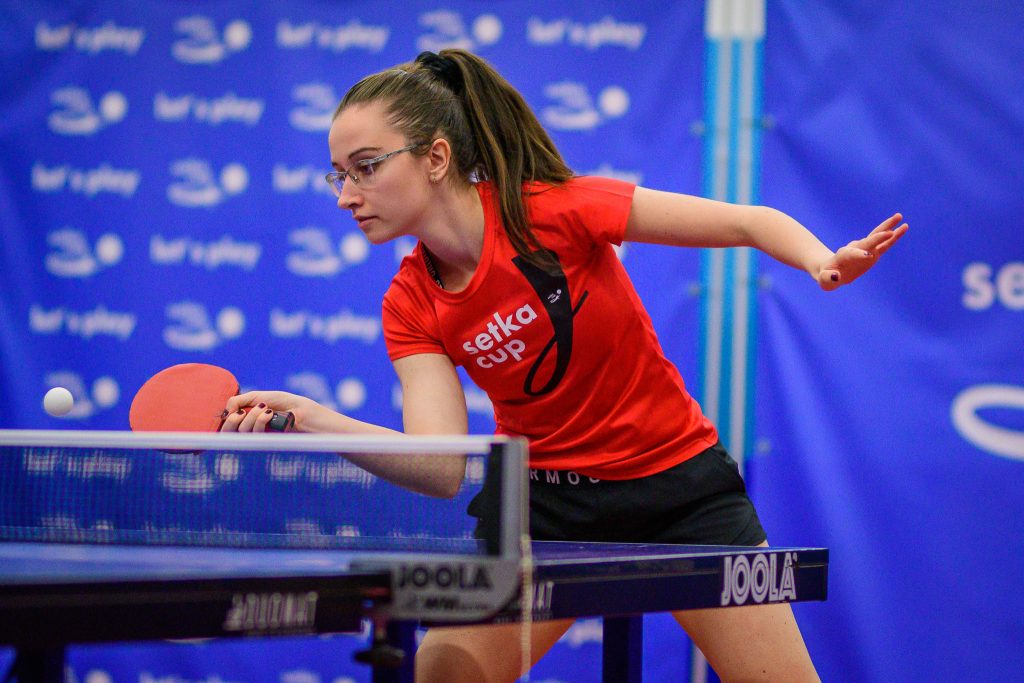
Photo: archive of Aneta Kohlmannová
Careful planning also plays a big role for Justýna Brýdlová from the Institute of Economic Studies, who trains the high jump under the Czech record holder Jaroslav Bába. She usually trains up to six times a week and tries to keep up while studying the Bachelor’s program in Economics and Finance. “It’s really demanding, especially during the exam period. I have to have everything well laid out and planned. This also requires determination and being able to deny yourself some things at times,” she describes.
Among her greatest achievements is the gold medal from the Junior Czech Republic Championship. This season, she would like to break her personal record outdoors and indoors. “I would like to jump 180 centimeters. And then my dream is to wear the national team jersey at some big event, for example the European Championship,” she says. Even though the feeling of satisfaction after a successful or challenging training session still fills her, she wants to focus mainly on her studies in the future. “Unfortunately, only a few people in the Czech Republic make a living from athletics, and my performance is not so high that I can devote myself only to that,” she adds.
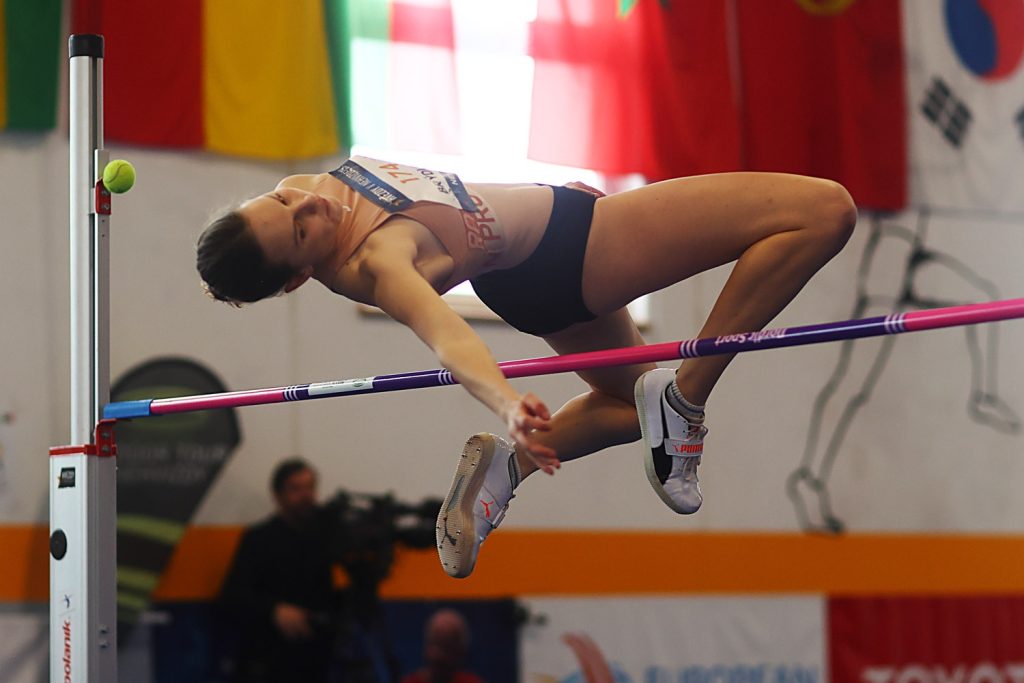
Photo: archive of Justýna Brýdlová
Some of our foreign students also try to combine sports and studies. For example, Lorenzo Calavaro, who comes from Italy and studies the Master’s program in International Security Studies at the Institute of Political Studies. He started playing basketball in his native country at the age of six. With the team, for example, they won regional competitions in the Italian region of Lazio, and in 2019 they reached the second league. During his study stay in Paris from 2022 to 2023, he had the opportunity to participate in the championship of French universities with the university team there (UPEC). “At this stage of my career, I am mainly focused on my studies. But who knows, maybe I’ll get a sporting opportunity that I won’t be able to refuse,” he says. “My dream is to play in major tournaments,” he adds.
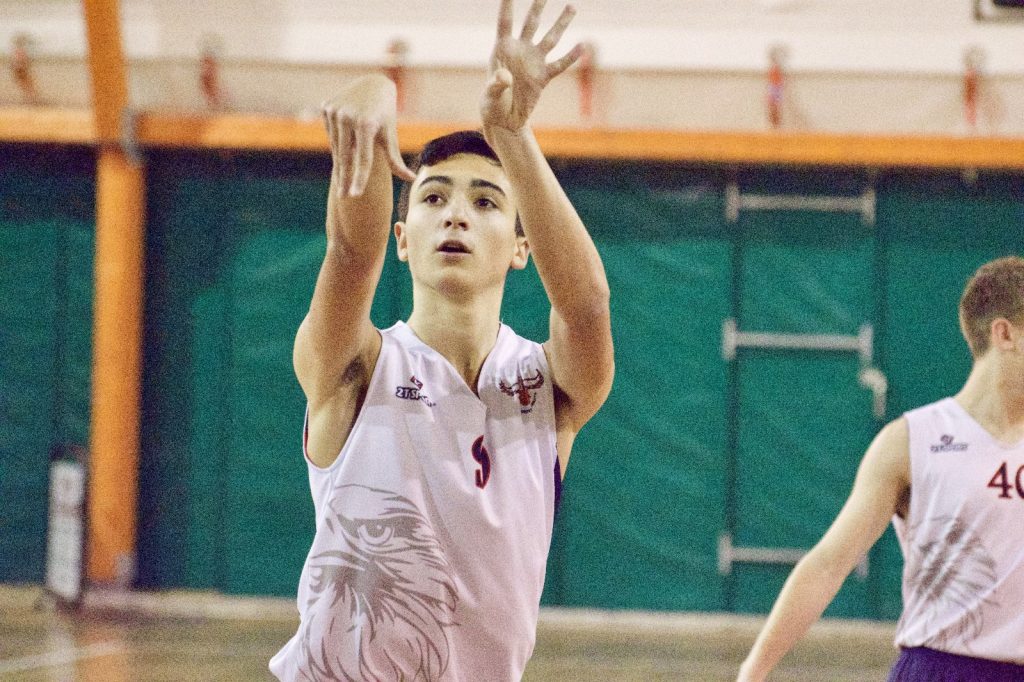
Photo: archive of Lorenzo Calavaro

